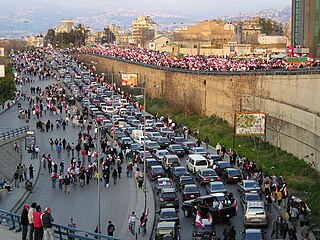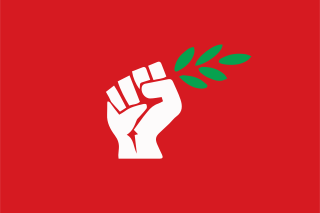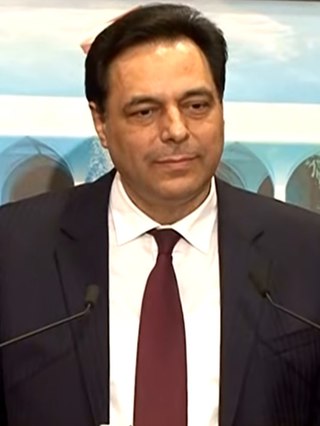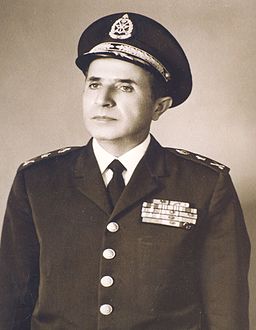Contents
| |||||
| Decades: | |||||
|---|---|---|---|---|---|
| See also: | |||||
Events in the year 2019 in Lebanon .
| |||||
| Decades: | |||||
|---|---|---|---|---|---|
| See also: | |||||
Events in the year 2019 in Lebanon .


Michel Naim Aoun is a Lebanese politician and former general who served as the 13th President of Lebanon from 31 October 2016 to 30 October 2022.

The Cedar Revolution or the Independence Intifada was a chain of demonstrations in Lebanon triggered by the assassination of former Lebanese Prime Minister Rafic Hariri. The popular movement was remarkable for its avoidance of violence, peaceful approach, and its total reliance on methods of civil resistance.

Saad El-Din Rafik Al-Hariri is a Lebanese-Saudi businessman and politician who served as the prime minister of Lebanon from 2009 to 2011 and 2016 to 2020. The son of Rafic Hariri, he founded and has been leading the Future Movement party since 2007. He is seen as "the strongest figurehead" of the March 14 Alliance.

Since 2004, a series of bombings and assassinations have struck Lebanon, most of them occurring in and around the capital, Beirut. This wave of bombings began with the assassination attempt on Marwan Hamadeh, then peaked with the assassination of former Prime Minister Rafic Hariri on 14 February 2005, which touched off the Cedar Revolution and the withdrawal of Syrian troops. After the massive protests sparked by Hariri's killing, several more bombings hit Lebanon.

The March 14 Alliance, named after the date of the Cedar Revolution, was a coalition of political parties and independents in Lebanon formed in 2005 that were united by their anti-Syrian stance and by their opposition to the March 8 Alliance. It was led by Saad Hariri, Walid Jumblatt and Samir Geagea, as well as other prominent figures.
Mohammad Safadi is a Lebanese businessman who served as minister of finance under Najib Mikati between 2011 and 2014. He was also the minister of economy and trade from 2008 to 2011.
Wissam Adnan al-Hassan was a brigadier general at the Lebanese Internal Security Forces (ISF) and the head of its intelligence-oriented Information Branch. Seen as a leading Sunni figure in Lebanon, he was also a key player in the opposition March 14 alliance without having a political position.

Hassan Diab is a Lebanese academic, engineer and politician who served as the prime minister of Lebanon from 21 January 2020 to 10 September 2021. He was appointed by President Michel Aoun in 2019 to succeed Saad Hariri as prime minister. He submitted his resignation on 10 August 2020 in wake of the 2020 Beirut explosion and served as caretaker prime minister until Najib Mikati formed a new government on 10 September 2021. Prior to his premiership, he served as the minister of education from June 2011 to February 2014 under President Michel Suleiman.
The following lists events that happened in 2007 in Lebanon.
The following lists events in the year 2017 in Lebanon.
Lebanese and Hezbollah officials reported that at 2:30 a.m. local time on 25 August 2019, two drones crashed into the Dahieh district of Beirut, Lebanon. According to Lebanese officials, Israel launched a drone attack. Hezbollah denied exploding or targeting the drones. It was the first such incident between Israel and Lebanon since the 2006 Lebanon War.

The 17 October Protests, commonly referred to as the 17 October Revolution or Hirak, were a series of civil protests in Lebanon that began after the Lebanese cabinet announced financial measures on 17 October 2019. These national protests were triggered by planned taxes on gasoline, tobacco, and VoIP calls on applications such as WhatsApp, but quickly expanding into a country-wide condemnation of sectarian rule, the stagnation of the economy, unemployment, endemic corruption in the public sector, legislation that was perceived to shield the ruling class from accountability and failures of the government to provide basic services such as electricity, water, and sanitation.
Events in the year 2020 in Lebanon.

A new Lebanese cabinet led by Prime Minister Hassan Diab was formed in Lebanon on 21 January 2020, after agreement was reached by the heads of the involved political parties after nearly three months. The already delegitimized government assigned Diab and his new cabinet, despite ongoing public outrage against the new cabinet and citizen requests for a competent, independent, and technocratic government. The marketing campaign by the authoritative powers around the new cabinet were mired by obvious untruths such as Diab claiming to have met "representatives of the thawra" but turned out to be regime supporters or the regime using the term "techno-political" to describe the new cabinet in order to justify the majority partisan appointments. Diab was appointed prime minister by President Michel Aoun following the resignation of Saad Hariri following the 2019–20 Lebanese protests, that started in October 2019. On 10 August 2020, the government resigned following public anger over the 2020 Beirut explosions on 4 August but continues to govern as a caretaker government.
Events in the year 2021 in Lebanon.

General elections were held in Lebanon on 15 May 2022 to elect all 128 members of the Lebanese Parliament. The country has for several years been the subject of chronic political instability as well as a serious economic crisis aggravated by the 2020 explosions that hit the Port of Beirut and faced large-scale demonstrations against the political class.
Events in the year 2022 in Lebanon.

The 2022 Speaker of the Lebanese Parliament election was an election to elect the speaker of the 24th Lebanese Parliament. It was 7th legislative speaker election since the implementation of the Taif Agreement in 1989.

Iskandar Ghanem was a Lebanese army general who was the commander-in-chief of the Lebanese army in the period from 1971 to 1975. He was close to Suleiman Frangieh and held the post during his presidency.